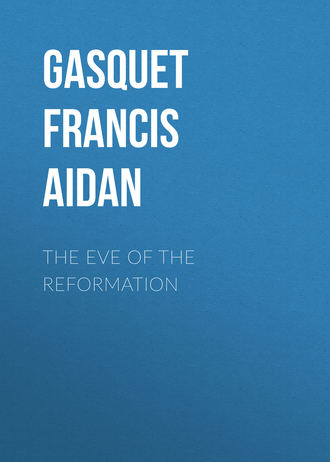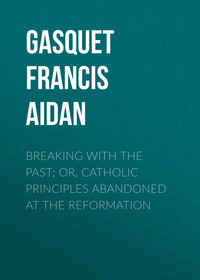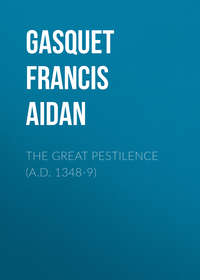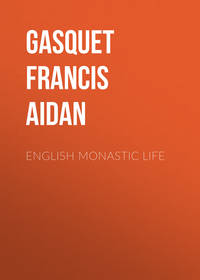 полная версия
полная версияThe Eve of the Reformation
25
B. Mus. Cotton MS. Julius F. vii., f. 118.
26
One of Prior Selling’s first acts of administration was apparently to procure a master for the grammar school at Canterbury. He writes to the Archbishop: “Also please it your good faderhood to have in knowledge that according to your commandment, I have provided for a schoolmaster for your gramerscole in Canterbury, the which hath lately taught gramer at Wynchester and atte Seynt Antonyes in London. That, as I trust to God, shall so guide him that it shall be worship and pleasure to your Lordship and profit and encreas to them that he shall have in governance.” —Hist. MSS. Com. 9th Report, App. p. 105.
27
I. Noble Johnson, Life of Linacre, p. 11. Among the great benefactors to Canterbury College, Oxford, was Doctor Thomas Chaundeler, Warden of New College. In 1473, the year after the election of Prior Selling, the Chapter of Christchurch, Canterbury, passed a resolution that, in memory of his great benefits to them, his name should be mentioned daily in the conventual mass at Canterbury, and that at dinner each day at Oxford he should be named as founder.
28
Galeni, De Temperamentis libri tres, Thoma Linacro interpretante, is dedicated to Pope Leo X., with a letter from Linacre dated 1521. “The widow’s mite was approved by Him whose vicar on earth” Pope Leo is, so this book is only intended to recall common studies, though in itself of little interest to one having the care of the world.
29
G. Lilii, Elogia, ed. P. Jovii, p. 91.
30
Ibid., lxiii. p. 145.
31
Sir Thomas More writing to Colet says: “I pass my time here (at Oxford) with Grocyn, Linacre, and our (George) Lilly: the first as you know the only master of my life, when you are absent; the second, the director of my studies; the third, my dearest companion in all the affairs of life” (J. Stapleton, Tres Thomæ, p. 165.) Another constant companion of More at Oxford was Cuthbert Tunstall, one of the most learned men of his day, afterwards in succession Bishop of London and Durham. Tunstall dedicated to More his tract De arte supputandi, which he printed at Paris in 1529.
32
Reg. Warham, in Knight’s Erasmus, p. 22 note.
33
Encyclop. Brit. sub nomine.
34
Ibid.
35
Ugo Balzani, Un’ ambasciata inglese a Roma, Società Romana di storia patria, iii. p. 175 seqq. Of this an epitome is given in Bacon’s Henry VII., p. 95. Count Ugo Balzani says: “Il prior di Canterbury sembra essere veramente stato l’anima dell’ ambasciata.” Burchardus, Rerum Urbanarum Commentarii (ed. Thuasne), i. p. 257, gives a full account of the reception of this embassy in Rome and by the Pope.
36
Harl. MS. 6237, and Add. MS. 15,673.
37
In the same beautifully written volume is a printed tract addressed to the Venetian Senate in 1471 against princes taking church property. The tract had been sent to the Prior of Christchurch by Christopher Urswick, with a letter, in which, to induce him to read it, he says it is approved by Hermolaus Barbarus and Guarini. Christopher Urswick was almoner to Henry VII., and to him Erasmus dedicated three of his works.
38
Leland, De Scriptoribus Britannicis, 482.
39
This information I owe to the kindness of Dr. Montague James.
40
Canterbury Letters (Camden Soc.), p. xxvii.
41
Ibid., p. 36, a letter in which Dr. Langton asks Prior Selling to “attend to the drawing of it.” The draft sermon is in Cleop. A. iii.
42
Richard Pace, De Fructu, p. 27. The work De Fructu was composed at Constance, where Pace was ambassador, and where he had met his old master, Paul Bombasius. He dedicates the tract to Colet, who had done so much to introduce true classical Latin into England, in place of the barbarous language formerly used. The work was suggested to him by a conversation he had in England two years before, on his return from Rome, with a gentleman he met at dinner, who strongly objected to a literary education for his children, on the ground that he disapproved of certain expressions made use of by Erasmus. The tract shows on what a very intimate footing Pace was with Bombasius.
43
De Fructu, p. 99. Pace published at Venice in 1522, Plutarchi Cheronei Opuscula, and dedicated the work to Bishop Tunstall. He reminds the bishop of their old student days, and says the translation has been examined by their “old master, Nicholas Leonicus.”
44
Ibid.
45
Ibid.
46
Ibid., p. 51. “Quas vocant proportionum inductiones … antiquitatem superasse.”
47
More to the University of Oxford, in Knight’s Erasmus, p. 31.
48
Bishop Fisher’s love and zeal for learning is notorious. He did all in his power to assist in the foundation of schools of sound learning at Cambridge, and especially to encourage the study of Greek. Richard Croke, the protégé of Archbishop Warham and Bishop Fisher, after teaching Greek in 1516 at Leipzig, was sent by Fisher in 1519 to Cambridge to urge the utility of Greek studies at that university. In the Orationes he delivered there, after speaking of the importance of Greek for all Biblical study, he says that Oxford had taken up the work with great avidity, since “they have there as their patrons besides the Cardinal (Wolsey), Canterbury (Warham), and Winchester, all the other English bishops except the one who has always been your great stay and helper, the Bishop of Rochester, and the Bishop of Ely.” It was entirely owing to Bishop Fisher’s generosity, and at his special request, that Croke had gone to Cambridge rather than to Oxford, whither his connection with Warham, More, Linacre, and Grocyn would have led him, in order to carry on the work begun by Erasmus.
49
Thomas Lupset was educated by Colet, and learnt his Latin and Greek under William Lilly, going afterwards to Oxford. There he made the acquaintance of Ludovico Vives, and at his exhortation went to Italy. He joined Reginald Pole in his studies at Padua, and on his return, after acting as Thomas Winter’s tutor in Paris, he held a position first as a teacher and then in Cardinal Wolsey’s household. In his Exhortation to Young Men, persuading them to a good life, “written at More, a place of my Lord Cardinal’s,” in 1529, he gives a charming account of his relation with a former pupil. “It happeneth,” he says, “at this time (my heartily beloved Edmund) that I am in such a place where I have no manner of books with me to pass the time after my manner and custom. And though I had here with me plenty of books, yet the place suffereth me not to spend in them any study. For you shall understand that I lie waiting on my Lord Cardinal, whose hours I must observe, to be always at hand lest I be called when I am not bye, which would be straight taken for a fault of great negligence. I am well satiated with the beholding of these gay hangings that garnish here every wall.” As a relief he turns to address his young friend Edmund. Probably Edmund doesn’t understand his affection, because he had always acted on the principle he has “been taught, that the master never hurteth his scholar more than when he uttereth and sheweth by cherishing and cokering the love he beareth to his scholars.” Edmund is now “of age, and also by the common board of houseling admitted into the number of men, and to be no more in the company of children,” and so now he can make known his affection. “This mind had I to my friend Andrew Smith, whose son Christopher, your fellow, I ever took for my son… If you will call to your mind all the frays between you and me, or me and Smith, you will find that they were all out of my care for ‘your manners.’ When I saw certain fantasies in you or him that jarred from true opinions, the which true opinions, above all learning, I would have masters ever teach their scholars. Wherefore, my good withipol, take heed of my lesson.”
50
John Clement, a protégé of Sir Thomas More, was afterwards a doctor of renown not only in medicine but in languages. He had been a member of More’s household, which Erasmus speaks of as “schola et gymnasium Christianæ religionis.” He is named at the beginning of the Eutopia, and Sir Thomas, in writing to Erasmus, says that Linacre declared that he had had no pupil at Oxford equal to him. John Clement translated several ancient Greek authors into Latin, amongst others many letters of St. Gregory Nazianzen and the Homilies of Nicephorus Callistus on the Saints of the Greek Calendar. Stapleton, in his Tres Thomæ (p. 250), says he had himself seen and examined with the originals these two voluminous translations at the request of John Clement himself. He had married Margaret, the ward of Sir Thomas More, and in the most difficult places of his translation he was helped by his wife, who, with the daughters of Sir Thomas, had been his disciple and knew Greek well. Mary Roper, More’s granddaughter, and the daughter of Margaret Roper, translated Eusebius’s History from Greek into Latin, but it was never published, because Bishop Christopherson had been at work on a similar translation. On the change of religion in Elizabeth’s reign, John Clement and his wife, with the Ropers, took refuge in the Low Countries. Paulus Jovius, in his Descriptio Britanniæ, p. 13, speaks of all three daughters of Sir Thomas More being celebrated for their knowledge of Latin.
51
Erasmi Opera (ed. 1703), Col. 40.
52
Ibid., Ep. 241.
53
Ibid., Ep. 363.
54
To take one example, Thomas Millyng, who as Bishop of Hereford died in 1492, had studied at Gloucester Hall, Oxford, as a monk of Westminster. During the old age of Abbot Fleet, of Westminster, he governed the monastery, and became its abbot in 1465. He was noted for his love of studies, and especially for his knowledge of Greek. This, says the writer of his brief life in the National Biographical Dictionary, was “a rare accomplishment for monks in those days.” He might have added, and for any one else!
55
Dennistoun, Memorials of the Dukes of Urbino, iii., pp. 415 seqq.
56
Erasmus to Abbot Bere. Opera, Ep. 700.
57
MS. Bodl. 80. It is the autograph copy of Free, cf. J. W. Williams, Somerset Mediæval Libraries, p. 87. It was Abbot Bere who, in 1506, presented John Claymond, the learned Greek scholar, to his first benefice of Westmonkton, in the county of Somerset. In 1516 Claymond became first President of Corpus Christi College, Oxford, often after signing himself, Eucharistiæ servus. Dr. Claymond procured for his college several Greek manuscripts which had belonged to Grocyn and Linacre, which are still possessed by it. At the end of MS. XXIII., which is a volume containing ninety homilies of St. John Chrysostom in Greek, is an inscription stating that this, and MS. XXIV., were copied in the years 1499 and 1500 by a Greek from Constantinople, named John Serbopylas, then living and working at Reading.
58
Ludovico Vives had been invited over to England by Cardinal Wolsey to lecture on rhetoric at Oxford. He lived at Corpus Christi College, then ruled by Dr. John Claymond, whom in his tract De conscribendis Epistolis he calls his “father.” The fame of this Spanish master of eloquence drew crowds to his lectures at the university, and amongst the audience Henry and Queen Katherine might sometimes be seen. For a time he acted also as tutor to the Princess Mary, and dedicated several works to the queen, to whose generosity he says he owed much. He took her side in the “divorce” question, and was thrown into prison for some weeks for expressing his views on the matter. Fisher, More, and Tunstall were his constant friends in England, and of Margaret Roper he writes, “from the time I first made her acquaintance I have loved her as a sister.” Among his pupils at Louvain, besides the above-named Canterbury monk, John Digon, he mentions with great affection Nicholas Wotton, whom the antiquary Twyne speaks of as returning to England with Digon and Jerome Ruffaldus, who calls Vives his “Jonathan,” and who subsequently became abbot of St. Vaast, Arras.
59
J. Venn, Gonville and Caius College (1349-1897), Vol. I.
60
Ibid., p. xvi.
61
Ibid., p. 18.
62
Ibid., p. 23.
63
Ibid., p. 21.
64
Ibid., p. xviii.
65
Sermons (1557), f. 54.
66
A. Chalmers, History of the Colleges, &c. of Oxford, ii. p. 351.
67
Hearne, John of Glastonbury, ii. p. 490; from MS. Cott. Vitellius c. vii.
68
Saint-German was born 1460. He was employed by Thomas Cromwell on some business of the State, and died in 1540. The Dyalogue was printed apparently first in Latin, but subsequently in English. It consisted of three parts (1) published by Robert Wyer, (2) by Peter Treveris, 1531, and (3) by Thomas Berthalet, also in 1531.
69
Dyalogue, ut sup., 3rd part, f. 2.
70
One of the first Acts of King Henry VII. on his accession, was to obtain from the Pope a Bull agreeing to some changes in the Sanctuary customs. Prior Selling of Canterbury was despatched as King’s Orator to Rome with others to Pope Innocent VIII. in 1487, and brought back the Pope’s approval of three points in which the king proposed to change these laws. First, that if any person in Sanctuary went out at night and committed mischief and trespass, and then got back again, he should forfeit his privilege of Sanctuary. Secondly, that though the person of a debtor might be protected in Sanctuary, yet his goods out of the precincts were not so protected from his creditors. Thirdly, that where a person took Sanctuary for treason, the king might appoint him keepers within the Sanctuary.
71
Robert Keilway, Relationes quorundam casuum, f. 188, seqq.
72
Dyalogue, ut sup., f. 12.
73
Dyalogue, f. 23.
74
Ibid.
75
Ibid., f. 23.
76
Ibid., f. 21.
77
Ibid., f. 21.
78
A treatyse concerning the power of the clergie and the laws of the realme. London, J. Godfray.
79
A treatyse, &c., ut supra, cap. 4.
80
A treatyse, &c., ut supra, cap. xii.
81
A treatyse, &c., ut supra, cap. xii.
82
Ibid., cap. xiii.
83
Ibid., cap. vi.
84
English Works (ed. 1557), p. 1017.
85
A treatyse, &c., ut sup., cap. vi., sig. E. i.
86
Salem and Bizance, a dialogue betwixte two Englishmen, whereof one was called Salem and the other Bizance (Berthelet, 1533), f. 76.
87
Ibid., f. 84.
88
English Works, p. 892.
89
Ibid.
90
A Dialogue, &c., ut sup., f. 8.
91
Ibid., f. 11.
92
Ibid., f. 14.
93
A Dialogue, &c., ut sup., p. 17.
94
History of English Law, i., p. 93-4. Mr. James Gairdner, in a letter to The Guardian, March 1, 1899, says: “There were, in the Middle Ages, in every kingdom of Europe that owned the Pope’s jurisdiction, two authorities, the one temporal and the other spiritual, and the head of the spiritual jurisdiction was at Rome. The bishops had the rule over their clergy, even in criminal matters, and over the laity as well in matters of faith. Even a bishop’s decision, it is true, might be disputed, and there was an appeal to the Pope; nay, the Pope’s decision might be disputed, and there was an appeal to a general council. Thus there was, in every kingdom, an imperium in imperio, but nobody objected to such a state of matters, not even kings, seeing that they could, as a rule, get anything they wanted out of the Popes – even some things, occasionally, that the Popes ought not to have conceded.”
95
William Bond, The Pilgrymage of perfeccyon, 1531, f. 223.
96
Roger Edgworth, Sermons, 1557, fol. 102
97
Edward Powell, Propugnaculum summi sacerdotii, &c., adversus M. Lutherum, 1523, fol. 22 and fol. 35.
98
English Works, p. 171.
99
Ibid. p. 185.
100
Ibid., p. 528.
101
Ibid., p. 538.
102
English Works, p. 616.
103
Ibid., p. 798.
104
Henry VIII. and the English Monasteries (popular edition), p. 367.
105
In his work against Luther, Bishop Fisher teaches the supremacy of the Pope without any ambiguity. In the Sermon had at Paulis against Luther and his followers, he also put his position perfectly clearly. The Church that has a right to the name Catholic has derived the right from its communion with the See of Peter. Our Lord called Cephas, Peter, or rock, to signify that upon him as a rock He would build His church. Unto Peter He committed His flock, and “the true Christian people which we have at this day was derived by a continual succession from the See of Peter” (fol. e. 4. d.).
106
Simon Matthew, Sermon made in the Cathedrall Church of Saynt-Paule, 27 June 1535 (Berthelet, 1535).
107
Joannis Longlondi Tres conciones (R. Pynson), f. 45.
108
Assertion of the Seven Sacraments against Luther (translation by J. W., 1687), f. a. i.
109
A treatise of the donation or gift and endowment of possessions given (by Constantine) with the judgement of certain great men, 1517, Thomas Godfray.
110
London, Thomas Berthelet.
111
A dyalogue, ut sup., ff. 3-7.
112
f. A. ii.; c. i.; c. iiij. The author recommends those who would understand the Pope’s power to “resort unto The glasse of truth or to the book named the Determinations of the universities.” The book named here A glasse of truth is written in favour of the divorce. “Some lawyers,” the author says, “attribute too much to the Pope – at length there shall be no law, but only his will.” The work was published by Berthelet anonymously, but Richard Croke, in a letter written at this period (Ellis, Historical Letters, 3rd series, ii. 195), says that the book was written by King Henry himself. It was generally said that Henry had written a defence of his divorce; but Strype did not think it was more than a State paper. Croke (p. 198) says that people at Oxford, “Mr. John Roper and others,” did not believe that the king was really the author. He says that the tract has done more than anything else to get people to take the king’s side.
113
Of the olde God and the new, B. 1. As another sample of what was at this time said about the Popes, we may take the following: Rome, says the author, “was by Justinian restored from ruin and decay, from whence also came the riches of the Church. At the coming of these riches, forthwith the book of the gospel was shut up, and the Bishops of Rome, instead of evangelical poverty, began to put forth their heads garnished with three crowns.” This is taken from the preface of Hartman Dulechin, who claims to have “taught the book to speak Latin.” It was originally printed and published in German. The English version is a translation of the Latin.
114
The Defence of Peace, written in Latin more than 200 years ago, and set forth in the English tongue by Wyllyam Marshall. R. Wyer, 1535, folio.
115
The Defence of Peace, f. 42. The well-known anti-papal opinions of Marsilius of Padua are, of course, of no interest in themselves, but their publication at this time in English shows the methods by which it was hoped to undermine the Papal authority in the country.
116
Exposition, &c., ut supra, f. i.
117
Johann Sturmius, Epistle sent to the cardinals and prelates that were appointed by the Bishop of Rome to search out the abuses of the Church. Translated by Richard Morysine. Berthelet, 1538.
A later copy of the Concilium de emendanda Ecclesia, printed by Sturmius with his letter in 1538, in the British Museum, formerly belonged to Cecil. The title-page has his signature, “Gulielmus Cecilius, 1540,” and there are marks and words underlined, and some few observations from his pen in the margin. It is interesting to note that what struck the statesman as a youth were just the points which could be turned against the temporal claims of the Roman See.
The special evils needing correction which the committee of cardinals note, and which they call abuses, are collected under 22 headings, some of which are the following: —
(1) Ordination of priests without cure of souls, not learned, of lower order in life, and too young and of doubtful morals: They suggest that each diocese should have a magistrum to see that candidates are properly instructed – none to be ordained except by their own bishop.
(2) Benefices, and in particular, episcopal sees, are given to people with interest, and not because their elevation would be good for the church. They suggest that the best man should be chosen, and residence should be insisted on, and consequently “non Italo conferendum est beneficium in Hispania aut in Britannia aut ex contra.”
(3) Pensions reserved from Benefices. Though the Pope, “who is the universal dispenser of the goods of the church,” may reserve a part for a pious use, e. g. for the poor, &c., still not to reserve sufficient for the proper purpose of the beneficiary, and still more to give a pension out of a benefice to one rich enough without, is wrong.
(4) Change of benefices for the sake of gain, and handing on benefices by arrangement or always assigning episcopal sees to coadjutors, is the cause of outcry against the clergy, and is in reality making private property out of what is public.




